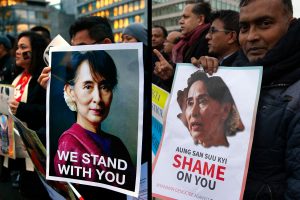Myanmar is facing a challenging year. The jurists on the International Court of Justice are considering whether Myanmar violated the Genocide Convention in its treatment of the country’s Muslim Rohingya population; the ruling National League for Democracy (NLD) is trying to pass constitutional amendments strongly opposed by the military; and the many stakeholders in the country’s peace process remain divided on key issues. Elections will be held later this year, and several parties are running on platforms emphasizing identity politics. This may unite certain constituencies but move the country further away from realizing an inclusive polity.
Under the Spotlight at the International Court of Justice
In December 2019, the International Court of Justice heard arguments by The Gambia and Myanmar regarding mass atrocities committed primarily by the Myanmar military against Rohingya civilians. The Gambia’s legal team drew on a 2018 United Nations fact-finding report that detailed the widespread burning of Rohingya villages, the killing of thousands of civilians including children, and pervasive rape. More than 700,000 Rohingya fled to Bangladesh. While it may take years before a judgment is reached, The Gambia urged the jurists to impose provisional measures on Myanmar to prevent further genocidal acts against the 600,000 Rohingya still in the country. The jurists did so on January 23, 2020. They ordered Myanmar to do everything possible to prevent the military or others from carrying out genocidal acts against the Rohingya, to preserve evidence related to the alleged crimes, and to report back semi-annually on the steps the government has taken.
Aung San Suu Kyi had stunned the world by deciding to lead her country’s legal defense team at The Hague in her capacity as foreign minister. She may have felt that by taking charge, there was a better chance of a favorable outcome. There was a domestic political benefit to be gained as well. At a time when her government was struggling to realize its 2015 election promises – namely peace, constitutional reform, and higher standards of living – she was able to strengthen her popularity by personally representing the country. This gave her and her party a boost going into an election year.
While much of the international community is dismayed by how the Rohingya have been treated, many in Myanmar have a different understanding of the situation. Since 2012, various political, military, and religious leaders in the country have incited fears of foreign domination and the end of Myanmar as a Buddhist nation. Such themes have been employed since the colonial era to rally citizens at critical moments.

































